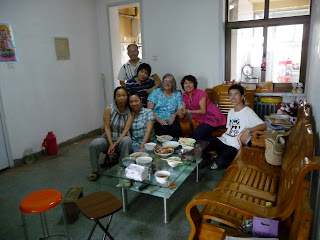
During training, we made a trip to Shinjianzhang to visit a former student, Susan. We only had a day and a half, but it was an amazing trip. We were concerned about the living arrangements we might find and whether or not they really had enough room for us to stay, but it turned out fine. They actually had a three bedroom apartment because Susan's father-in-law sometimes stays with them, and the bedrooms were air conditioned, so they were quite comfortable. The city was a two hour bullet train ride from Beijing, and we found out later that it was the capital of Hebei province.
When we arrived at the railroad station, Susan was especially excited because her son had just gotten his senior school exam scores and they were very high. In their city of 5 million people, he scored 4th place of all of the junior high students! This exam is very important in China because it determines where a student will go to high school and eventually what University he will attend. Because he scored so well, it reflects on his school, and more students will want to attend there, and of course, he can choose which high school he wants to attend. We were as excited as Susan was, because we know how hard he studied and how important it was in his life.
After her husband got off of work, we all went to a very nice restaurant for a Peking duck dinner. We were escorted into a semi-private room with a table set for twelve, which was surprising for the four of us. It turned out that some friends and their daughter, as well as Susan's son joined us. Last year, when Susan and her family visited us at our campus, her husband surprised us by sneaking to the cashier and paying the bill. Paul has been waiting all year for the opportunity to do the same, so when Susan was looking at the menu and her husband was out of the room, he was able to give the waiter the money for dinner. When his trick was discovered, everyone had a good laugh because Paul had learned the Chinese way.
The next day, was an opportunity to participate in everyday life in China. While Paul and son David rode bikes to his middle school, the women (neighbors dropped by to help) made zhongzi, or sticky rice dumplings and jiaozi, or boiled dumplings for lunch. They showed me how to wrap the sticky rice in a special kind of leaf to form the little pyramid, while keeping the rice inside. I wasn't very good at it, but it was a lot of fun trying. We then filled and shaped at least two hundred dumplings in preparation for boiling. I learned how to prepare and roll the dough into little circles and then fill them with a bit of stuffing, made with bitter melon, ground pork and lots of garlic, ginger and other seasonings. I also learned how to shape them in little half moons and fancy shapes such as mice. This picture shows Susan putting some of the dumplings into the water to boil.
 The neighbors stayed for lunch and we had a great time trying to communicate in Chinese, English and sign language. As you can see, our lunch table was actually the living room coffee table with a variety of stools for sitting.
The neighbors stayed for lunch and we had a great time trying to communicate in Chinese, English and sign language. As you can see, our lunch table was actually the living room coffee table with a variety of stools for sitting.  After lunch it was time to head back to the train station, so Susan's husband went downstairs to get a taxi. When we followed in a few minutes, he had two taxi's because almost everyone was going with us to the train station! When we arrived, there was a long line and only those with tickets were allowed in the station. That didn't seem to be a problem for our little group, because after some animated discussion, a security guard escorted us all around the waiting crowd and through a separate door into a special air conditioned waiting room. Then, when it was time to board the train, our entourage continued to the door of the train to make sure we were safely on board. It was a really fun ending to a wonderful visit!
After lunch it was time to head back to the train station, so Susan's husband went downstairs to get a taxi. When we followed in a few minutes, he had two taxi's because almost everyone was going with us to the train station! When we arrived, there was a long line and only those with tickets were allowed in the station. That didn't seem to be a problem for our little group, because after some animated discussion, a security guard escorted us all around the waiting crowd and through a separate door into a special air conditioned waiting room. Then, when it was time to board the train, our entourage continued to the door of the train to make sure we were safely on board. It was a really fun ending to a wonderful visit!










































